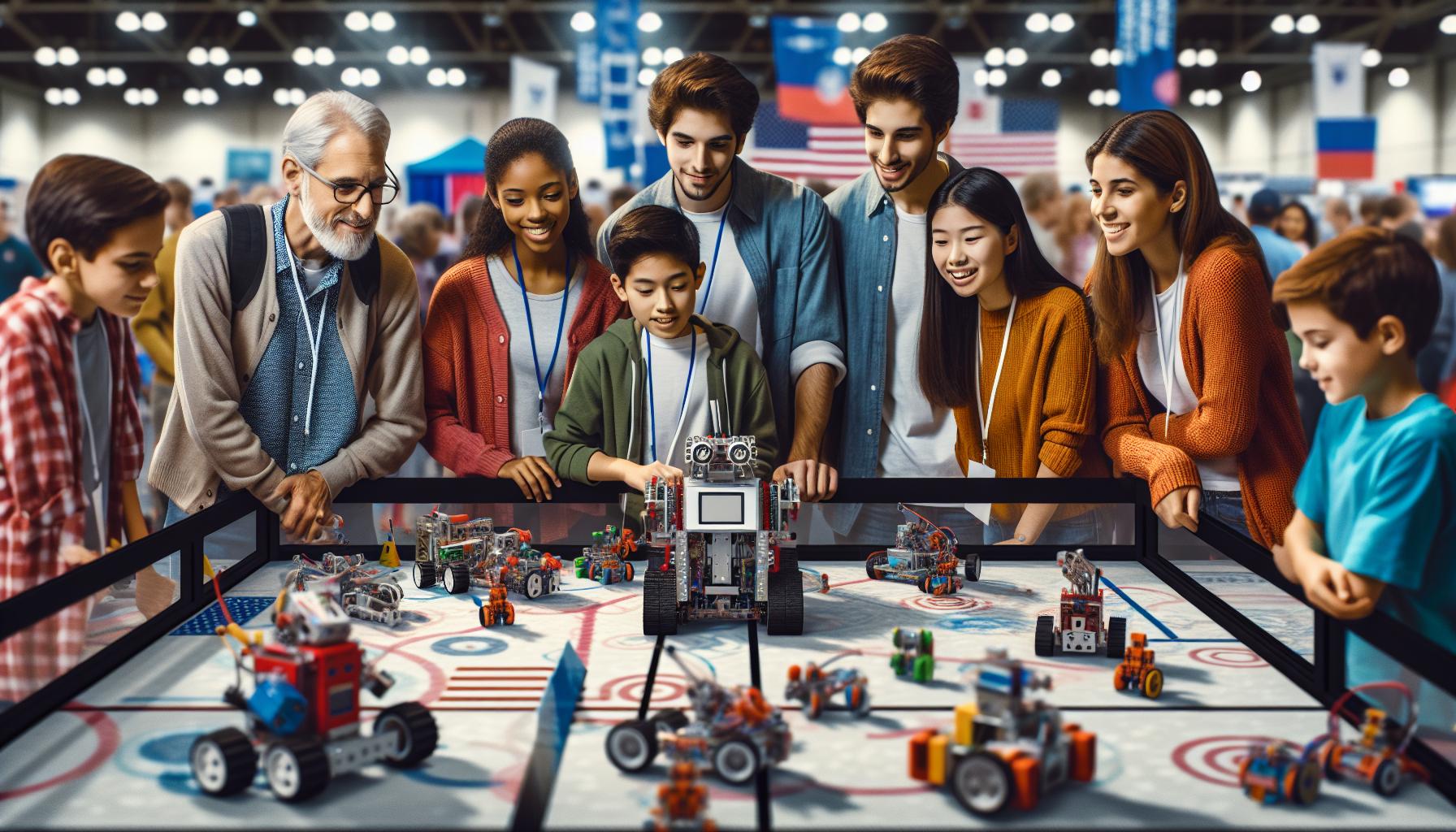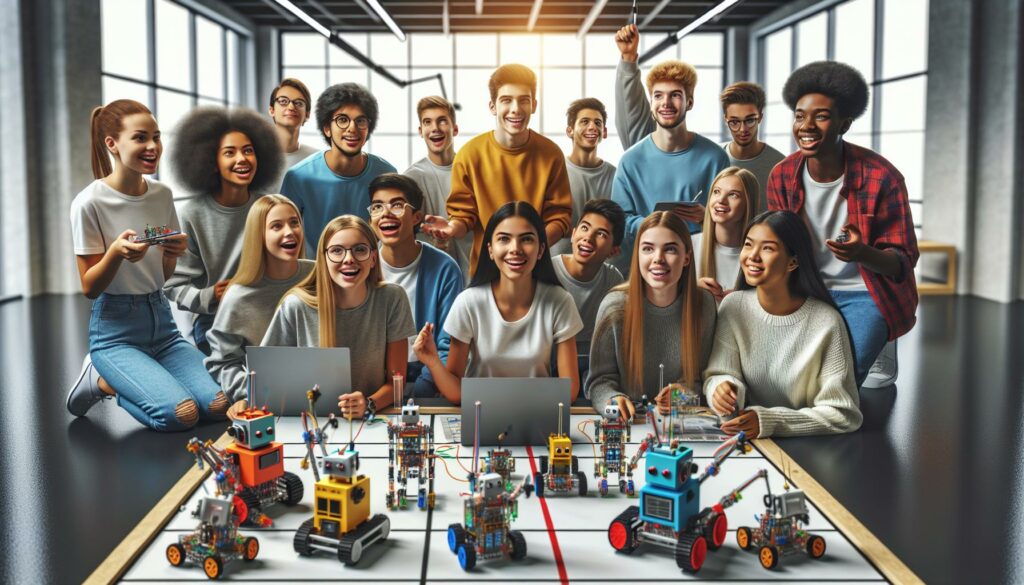Every April, I find myself eagerly anticipating National Robotics Week, a celebration that highlights the incredible advancements in robotics and their impact on our lives. This annual event brings together enthusiasts, students, and professionals to explore the limitless possibilities of robotics technology. From educational workshops to exciting competitions, it’s a week filled with inspiration and innovation.
As someone deeply fascinated by the intersection of technology and creativity, I can’t help but marvel at how robotics is reshaping industries and education. National Robotics Week offers a unique opportunity to witness firsthand the groundbreaking projects and ideas that are driving the future. Whether you’re a seasoned expert or a curious newcomer, there’s something for everyone to discover and enjoy.
By spotlighting the importance of robotics, this event encourages us all to think about how these technologies can solve real-world problems and improve our daily lives. It’s a celebration of human ingenuity and the potential for a brighter, tech-driven future.
Key Takeaways
- National Robotics Week occurs every April to celebrate advancements in robotics and their impact on various sectors, fostering innovation and education.
- Initiated in 2010 and supported by US Congress, this event promotes awareness and engagement in robotics, highlighting its importance in STEM fields.
- The Week features a variety of events, including competitions like RoboGames, workshops, and educational sessions, offering hands-on learning experiences.
- National Robotics Week plays a crucial role in encouraging STEM education and inspiring future careers in robotics by connecting learners with professionals.
- Community involvement is pivotal; partnerships with educational institutions and industry leaders bridge gaps between technology, education, and society.
- Individuals can participate in National Robotics Week through attending events, competing, volunteering, joining virtual sessions, organizing local activities, and engaging online.
The Origins of National Robotics Week
National Robotics Week started in 2010 to highlight the growing importance of robotics in the US. Spearheaded by iRobot Corp. and the Technology Collaborative, the initiative aimed to increase awareness and engagement with robotics as a means of fostering innovation. The event sought to emphasize robotics’ role across various sectors, including education and industry.
In 2009, the US Congress formally recognized the need for a national event dedicated to robotics, and their support paved the way for this annual celebration. The nationwide initiative was launched with the goal of inspiring students to pursue careers in science, technology, engineering, and math (STEM) fields. Official recognition further cemented the significance of robotics in driving technological advances.
Organizers ensured that National Robotics Week brought a diverse array of activities, enabling participants to showcase and explore robotic technology’s multifaceted applications. Through collaborations with academic institutions and industry leaders, the Week has effectively promoted robotics education and innovation.
Key Highlights and Events

National Robotics Week captivates audiences with its array of events designed to engage and inspire participants. This section explores the diverse activities available, shedding light on the dynamic experiences offered during the week.
Competitions and Showcases
Competitions and showcases serve as the centerpiece of National Robotics Week. Enthusiasts and students present their innovative projects through a mix of contests and demonstrations. High-profile events, including the RoboGames—the world’s largest robotics competition—bring together participants from across the globe. Teams compete in categories such as combat, autonomous, and humanoid robots, spotlighting cutting-edge advancements. Exhibitions feature industry-leading robotics companies unveiling the latest prototypes and technologies. Attendees witness remarkable feats of automation and ingenuity, providing firsthand glimpses into the future of robotics.
Workshops and Educational Sessions
Workshops and educational sessions offer attendees hands-on experiences and in-depth learning opportunities. These sessions cover essential topics like robot programming, design, and engineering principles. Universities and tech companies collaborate to lead sessions that align with current industry needs. Interactive workshops for different age groups ensure participants—from children to professionals—gain valuable insights. Specialized sessions target educators, providing resources and strategies to incorporate robotics into curricula. Participants leave with enhanced skills and knowledge, inspired to dive deeper into the realm of robotics.
Impact on Innovation and Technology

National Robotics Week plays a pivotal role in driving innovation and technological advancements. This event fosters a culture of learning and growth in the fields of science, technology, engineering, and mathematics.
Encouraging STEM Education
By promoting robotics activities, National Robotics Week ignites interest in STEM education. Learners engage with practical, hands-on workshops and interactive sessions that bridge theoretical concepts with real-world applications. As students design and program robots, they develop problem-solving skills and gain a deeper understanding of STEM subjects. Educational institutions collaborate with tech companies to create curricula that enhance both teaching methodologies and learning outcomes.
Inspiring Future Robotics Careers
The event serves as a catalyst for inspiring future career paths in robotics and related fields. Participants interact with industry professionals through panels, demonstrations, and mentorship opportunities, providing insight into the diverse job prospects available in the robotics industry. These encounters help demystify the road to a career in robotics and motivate aspiring technologists to pursue roles in research, development, and innovation. By highlighting success stories and cutting-edge technologies, National Robotics Week empowers individuals to envision their potential contributions to the technological landscape.
Community Involvement and Support

Community involvement plays a vital role in the success of National Robotics Week. With contributions from educational institutions and industry leaders, the event bridges gaps between technology, education, and society.
Partnerships with Schools and Universities
Schools and universities form the backbone of National Robotics Week. They host workshops, lectures, and competitions that engage students and educators in STEM learning. For example, MIT and Stanford frequently offer robotic programming classes for students of all levels. Instructors from these institutions design curriculum activities that cater to young minds, fostering early interest in technology through projects and hands-on experiences. In addition to teaching practical skills, these partnerships provide mentorship opportunities, where experienced educators guide students in exploring career paths within the tech industry.
Industry Collaborations
Collaborations with leading tech companies enhance the event’s impact. Companies like iRobot and Boston Dynamics sponsor activities and showcase groundbreaking technologies. Through these collaborations, participants gain exposure to real-world applications of robotics across various sectors, such as healthcare and manufacturing. Industry professionals conduct demonstrations and panels, sharing insights into current trends and future advancements. Participants also benefit from networking opportunities, connecting with experts and peers in the field. Such interactions pave the way for future innovations and partnerships.
How to Participate in National Robotics Week
Participating in National Robotics Week offers a wealth of opportunities for individuals to engage with cutting-edge technology and connect with the robotics community. Here are some ways to get involved:
- Attend Local Events: Explore and attend robotics events in your area, such as workshops and exhibitions. By supporting local hosts, access resources and knowledge shared by nearby enthusiasts.
- Join Robotics Competitions: Whether a beginner or experienced enthusiast, find competitions that match skill levels. Engage with RoboGames or local challenges, showcasing projects and gaining public feedback.
- Volunteer at Events: Contribute time and skills to help execute events successfully. Gain insights through volunteering, network with organizers, and expand understanding of robotics activities.
- Participate in Virtual Events: If physical attendance isn’t possible, register for virtual workshops and webinars. Many events offer online participation covering topics like AI, automation, and robotics ethics.
- Organize a Robotics Event: Hosts can create events, encouraging community involvement. Schools or community centers serve as ideal venues for workshops and demonstrations. Seek partnerships with tech companies for resources.
- Share Experiences on Social Media: Engage with the wider robotics community online by sharing experiences and insights. Use hashtags related to National Robotics Week to find and connect with like-minded individuals.
Taking part in these activities enhances knowledge, sparks interest in new technologies, and fosters collaboration within the robotics field.
National Robotics Week is more than just an event; it’s a celebration of innovation and a catalyst for future advancements. The diverse activities and collaborations with educational institutions and industry leaders ensure that participants gain valuable insights into the world of robotics. By engaging with the community and embracing the opportunities this week offers, we can all contribute to the growth and development of robotics. Whether through attending events, volunteering, or simply spreading the word, our involvement helps inspire the next generation of innovators. Let’s continue to support and participate in this exciting week to drive technological progress and foster a culture of learning and creativity.

